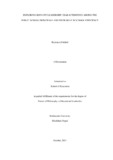
Please use this identifier to cite or link to this item:
https://hdl.handle.net/20.500.14301/259| Title: | EXPLORING SERVANT LEADERSHIP CHARACTERISTICS AMONG THE PUBLIC SCHOOL PRINCIPALS AND THEIR ROLE IN SCHOOL EFFICIENCY |
| Authors: | Pokhre, Rupendra |
| Citation: | Pokhrel,R.(2013).Exploring servant leadership characteristics among the public school principals and their role in school efficiency. |
| Issue Date: | Oct-2013 |
| School: | SOED |
| Department: | DOEL |
| Level: | M.Phil. |
| Program: | M.Ed. in Leadership and Management (Two Year Program) |
| Abstract: | Evidences show that servant leadership is an emerging leadership theory hiving its practices in diverse organizational settings including schools and colleges. “Servant leadership is a leadership model that is gaining popularity because this model has been shown to be effective in both the public and private sectors” (Kasun, 2009, p. 4). So, it has attracted the attention of scholars and has also remained as one of the most studied leadership theory in the era. However, in Nepalese education field, this theory was not tested until this study made an attempt. Therefore, the purpose of this descriptive study was to explore the servant leadership characteristics among the public school principals, examine the association between servant leadership and their age, education and experience and look into the contribution of servant leadership in student promotion rate for school efficiency. It had set three research questions and second and third research questions were answered by four hypotheses. Designed quantitatively under post-positivistic paradigm, this study conducted a survey among 116 randomly selected public school principals of secondary level in three districts – Kathmandu, Lalitpur and Bhaktapur by using the SLPR, a seven point Likertscale developed by Page and Wong (2003) for self assessment of servant ii leadership. Similarly, promotion rate for internal school efficiency, delimited to secondary level, was measured with the equation developed on the basis of the literature review which took the data of grade ten students of the year 2068 BS. The data analysis was carried out in three distinct phases: the first phase analyzed the data to explore the prevalence of servant leadership characteristics of the principals and found out that almost all the principals had these characteristics in varying number but only 31 principals possessed all seven servant leadership characteristics, majority of whom was female. In the second phase, the principals categorized as NSL and SL in the first phase were examined for the association of servant leadership with age, education and experience performing a Chi Square test. Statistically significant associations were revealed by the test at = 0.01 for ages and = 0.001 for education and experience. In the third phase, to explore the role of servant leadership in promotion rate for school efficiency, the fourth hypothesis was tested using a t-test which rejected the null hypothesis at = 0.05 thereby establishing statistically significant difference in promotion rat of the students on the basis of servant leadership characteristics among the principals. This study has made an important place in the existing literature by exploring the association of servant leadership with age, education and experience of practitioner. Furthermore, its most highlighted implacability is that this study can provide content and procedure for pre-service and in-service teacher training course. Its significance in enhancing promotion rate of the students calls for development of servant leadership characteristics among the public school principals. |
| URI: | https://hdl.handle.net/20.500.14301/259 |
| Appears in Collections: | Dissertation |
Files in This Item:
| File | Description | Size | Format | |
|---|---|---|---|---|
| Rupendra Pokhrel Dissertation 2013.pdf | 2.29 MB | Adobe PDF |  View/Open |
Items in DSpace are protected by copyright, with all rights reserved, unless otherwise indicated.